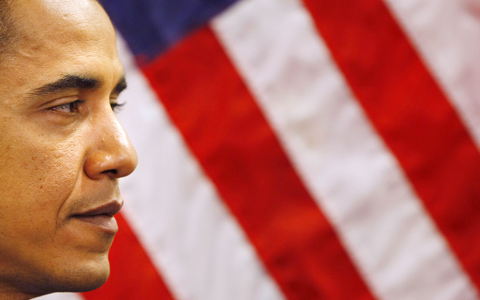US president-elect Barack Obama’s dedication to addressing climate change will be tested on his first day in the White House, where a few strokes of the pen could radically change Bush administration policies. Obama takes office on Tuesday in the midst of an economic crisis, and he will have to build a consensus to effect broad change. But some major actions — and symbolic ones — are solely at his discretion.
“He should find Jimmy Carter’s solar panels, wherever Ronald Reagan threw them, and put them back up on the White House, because they probably still work,” said Danny Kennedy, president of San Francisco Bay Area solar installer Sungevity.
There are plenty of other public buildings to upgrade, said David Doniger, climate center policy director at the Natural Resources Defense Council.

PHOTO: AP
Obama could change, for instance, government procurement policies as soon as he is in office — from buying more alternative energy power to weatherizing federal buildings.
But the biggest focus by environmentalists is on allowing California and some 19 other states to begin regulating carbon pollution from cars to address global warming. California said that its proposed standards would reduce greenhouse gases considerably.
“Everything hinges on the approval for California. Once it’s approved for California, it takes place everywhere else,” Doniger said.
The US Environmental Protection Agency has turned down the request to regulate carbon by the most populous state. Obama, however, can direct the agency to reverse course.
That is one of four Day One issues lobbied for by the Sierra Club. The nature group also wants the government to begin regulating carbon emissions from power plants — the Supreme Court said the EPA could regulate greenhouse gases as pollutants, but the agency has not.
In addition, Obama should get the EPA to use the Clean Water Act to slow mountaintop-removal coal mining and set a target for US carbon dioxide reduction — 35 percent by 2020, the club said.
“None of them get in the way of any challenges he faces right now: None of them will slow down the creation of new jobs, none of them will exacerbate the federal deficit. They all require him to draw a sharper line between the Bush past and the Obama future,” Sierra Club executive director Carl Pope said.
He predicted Obama would do about half the wish list in the first two or three weeks.
Washington lawyer Peter Wyckoff, a partner specializing in environmental law at Pillsbury Winthrop, said Obama could take dramatic action by ordering the EPA to develop a national plan to regulate carbon emissions that contribute to global warming.
The Clean Air Act gives the EPA latitude to create a carbon trading system, like the one used in Europe. Supporters of the idea saw it as a way to nudge Congress.
“The Obama administration in their view should put this in place in proposed form so as to create a sword, if you will, over the head of Congress to create Congress’s own program,” Wyckoff said.

Kehinde Sanni spends his days smoothing out dents and repainting scratched bumpers in a modest autobody shop in Lagos. He has never left Nigeria, yet he speaks glowingly of Burkina Faso military leader Ibrahim Traore. “Nigeria needs someone like Ibrahim Traore of Burkina Faso. He is doing well for his country,” Sanni said. His admiration is shaped by a steady stream of viral videos, memes and social media posts — many misleading or outright false — portraying Traore as a fearless reformer who defied Western powers and reclaimed his country’s dignity. The Burkinabe strongman swept into power following a coup in September 2022

‘FRAGMENTING’: British politics have for a long time been dominated by the Labor Party and the Tories, but polls suggest that Reform now poses a significant challenge Hard-right upstarts Reform UK snatched a parliamentary seat from British Prime Minister Keir Starmer’s Labor Party yesterday in local elections that dealt a blow to the UK’s two establishment parties. Reform, led by anti-immigrant firebrand Nigel Farage, won the by-election in Runcorn and Helsby in northwest England by just six votes, as it picked up gains in other localities, including one mayoralty. The group’s strong showing continues momentum it built up at last year’s general election and appears to confirm a trend that the UK is entering an era of multi-party politics. “For the movement, for the party it’s a very, very big

ENTERTAINMENT: Rio officials have a history of organizing massive concerts on Copacabana Beach, with Madonna’s show drawing about 1.6 million fans last year Lady Gaga on Saturday night gave a free concert in front of 2 million fans who poured onto Copacabana Beach in Rio de Janeiro for the biggest show of her career. “Tonight, we’re making history... Thank you for making history with me,” Lady Gaga told a screaming crowd. The Mother Monster, as she is known, started the show at about 10:10pm local time with her 2011 song Bloody Mary. Cries of joy rose from the tightly packed fans who sang and danced shoulder-to-shoulder on the vast stretch of sand. Concert organizers said 2.1 million people attended the show. Lady Gaga

SUPPORT: The Australian prime minister promised to back Kyiv against Russia’s invasion, saying: ‘That’s my government’s position. It was yesterday. It still is’ Left-leaning Australian Prime Minister Anthony Albanese yesterday basked in his landslide election win, promising a “disciplined, orderly” government to confront cost-of-living pain and tariff turmoil. People clapped as the 62-year-old and his fiancee, Jodie Haydon, who visited his old inner Sydney haunt, Cafe Italia, surrounded by a crowd of jostling photographers and journalists. Albanese’s Labor Party is on course to win at least 83 seats in the 150-member parliament, partial results showed. Opposition leader Peter Dutton’s conservative Liberal-National coalition had just 38 seats, and other parties 12. Another 17 seats were still in doubt. “We will be a disciplined, orderly